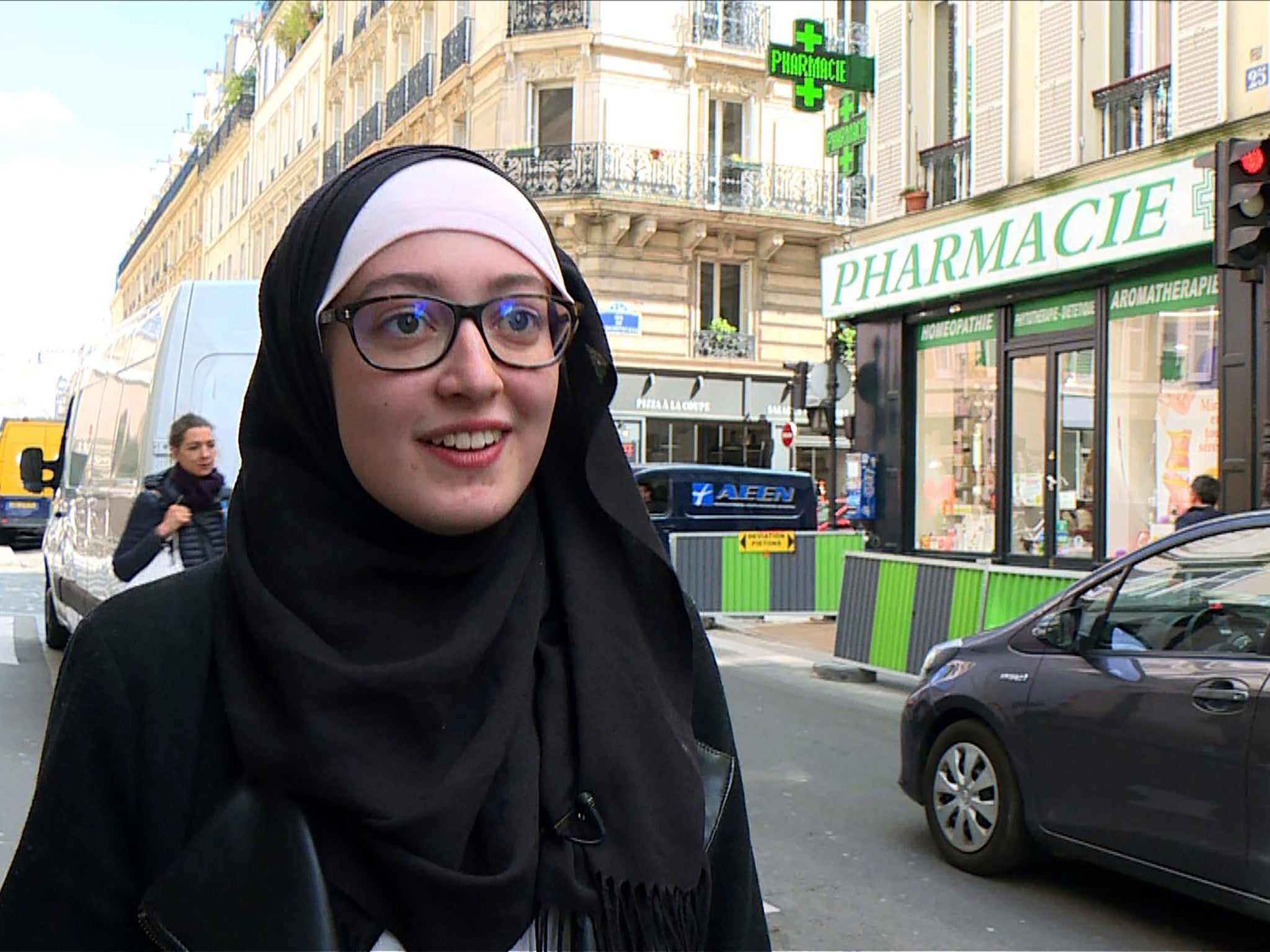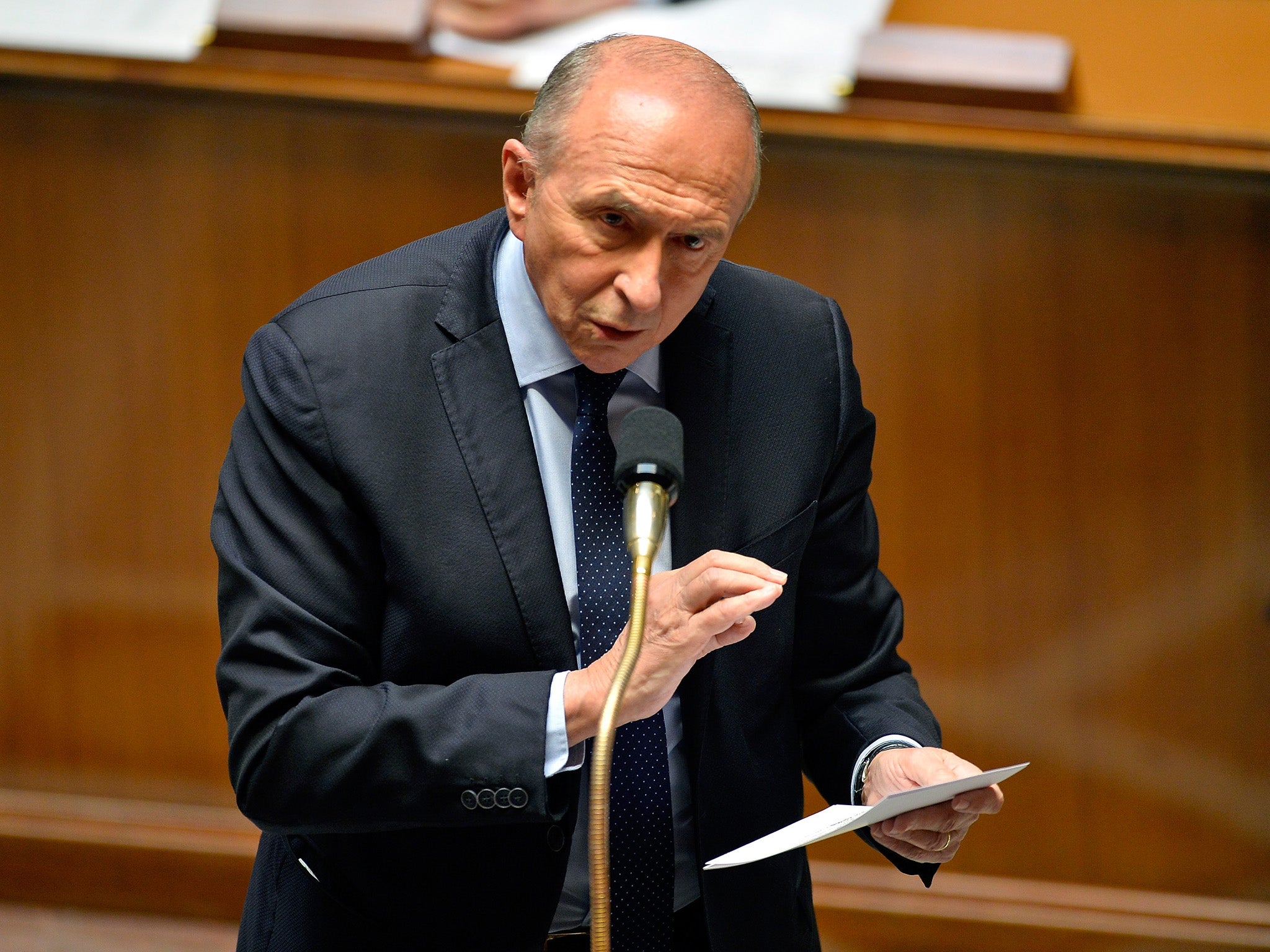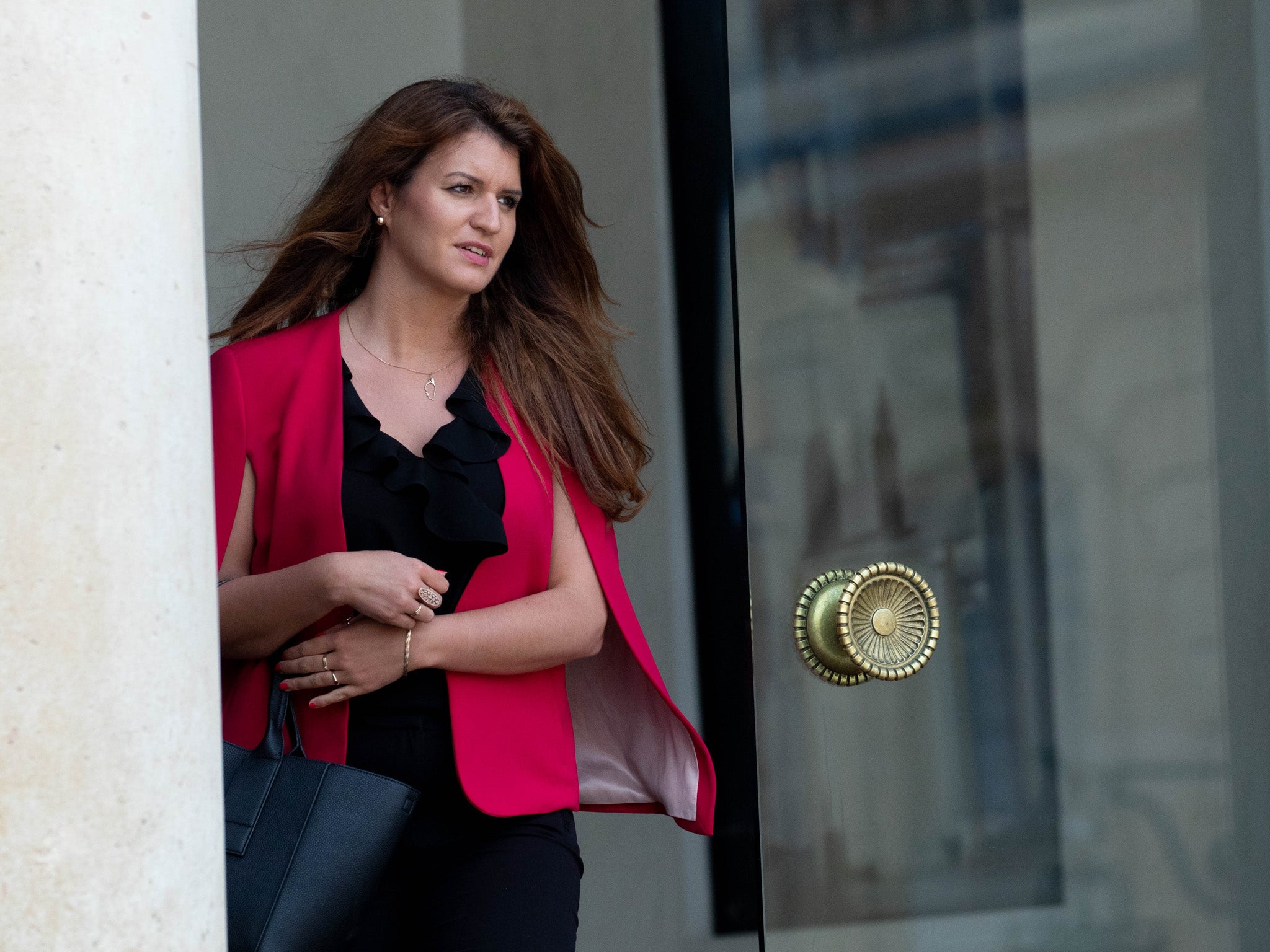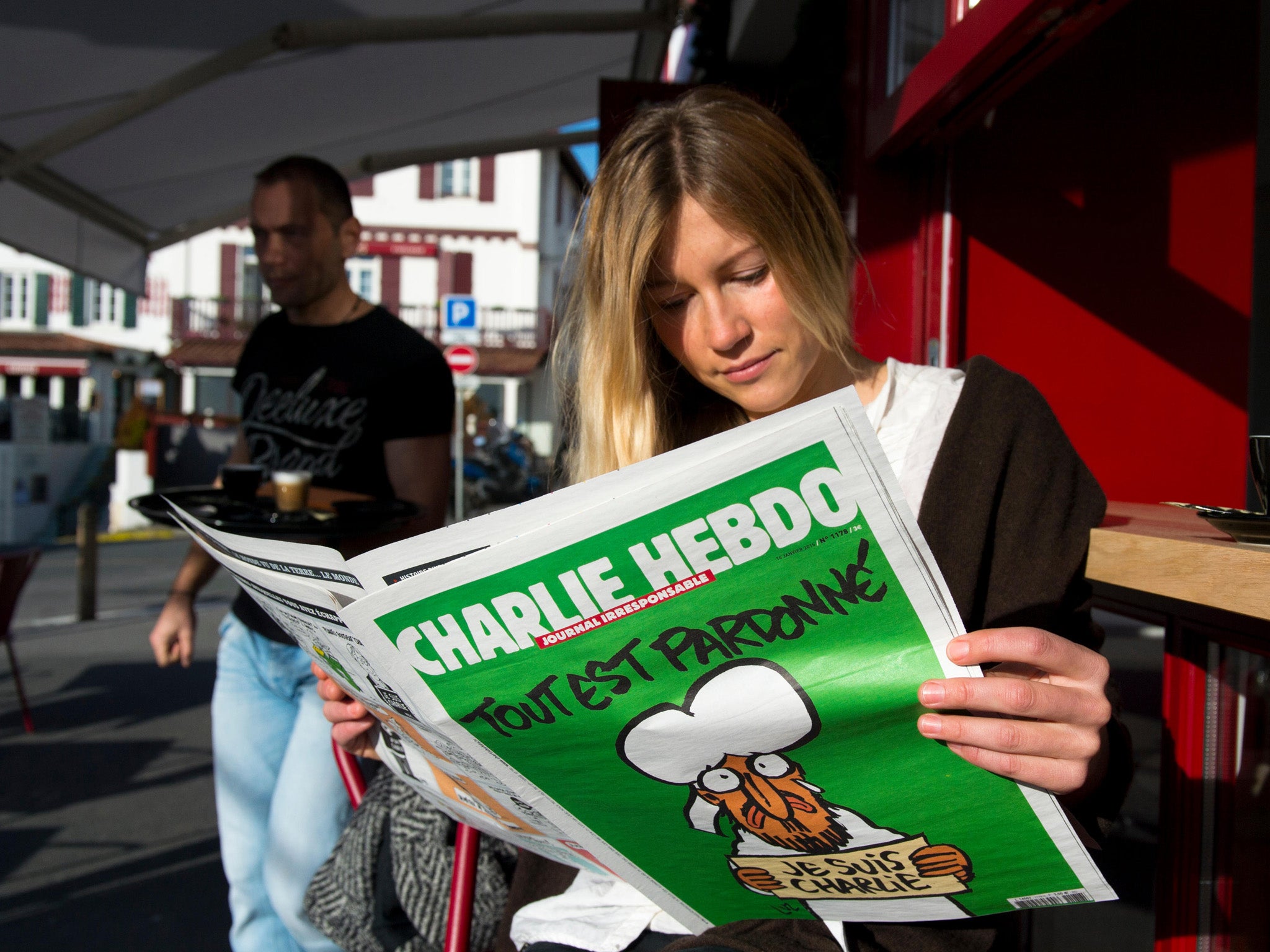French secularists outraged after student wears headscarf during TV interview
The debate has nothing to do with the changes to education policy she protested against and everything to do with her appearance

Your support helps us to tell the story
From reproductive rights to climate change to Big Tech, The Independent is on the ground when the story is developing. Whether it's investigating the financials of Elon Musk's pro-Trump PAC or producing our latest documentary, 'The A Word', which shines a light on the American women fighting for reproductive rights, we know how important it is to parse out the facts from the messaging.
At such a critical moment in US history, we need reporters on the ground. Your donation allows us to keep sending journalists to speak to both sides of the story.
The Independent is trusted by Americans across the entire political spectrum. And unlike many other quality news outlets, we choose not to lock Americans out of our reporting and analysis with paywalls. We believe quality journalism should be available to everyone, paid for by those who can afford it.
Your support makes all the difference.The French interior minister, Gérard Collomb, called her appearance “shocking”. Marlène Schiappa, the minister of gender equality, said she exhibited a “manifestation of political Islam”. Satirical magazine Charlie Hebdo put her on its cover, with a drawing many considered racist.
Her offence: wearing a headscarf during a television interview.
Elected last December as leader of the Sorbonne chapter of the French National Students’ Union, Maryam Pougetoux, 19, is used to hearing from those who disagree with her progressive views. But she was entirely unprepared for what happened last month after she criticised changes in educational policy during the interview.
Pougetoux, a practising Muslim who wears a head scarf that covers her hair and neck, had been asked to comment on one of the main television channels, M6, about proposed changes that would make admission to universities more selective. She and the hordes of students who took to the streets recently in protest consider the measure discriminatory and elitist.
But the debate that followed had nothing to do with education and everything to do with her appearance. It was set off in large part by Laurent Bouvet, a secularist and member of a group called Le Printemps Républicain, or Republican Spring.

The group was created in 2016 to defend the French republican ideal of “laïcité,” which emerged during the revolution as a way to keep the Roman Catholic Church out of the affairs of state. But in recent years, critics say, some groups have used it to suppress the growing influence of Islam in France.
In a Twitter post, Bouvet said, “we aren’t hunting anyone but merely pointing to the inconsistency” of a leader of the student group wearing a headscarf. “How can one defend values like abortion and feminist principles while displaying conspicuously their religious beliefs,” he asked.
Pretty soon, it seemed that almost everyone had something to say about this unapologetically religious student.
Pougetoux herself was baffled by the outburst, saying she had to research “political Islam” online to understand the accusation. She also was not particularly outraged by the caricature of her on the profanity-laced cover of Charlie Hebdo, which many said made her look like a monkey.
“I first laughed. Charlie Hebdo mocks everyone, I didn’t take it personally,” she said. What she liked, she says, is that, “they were the only ones who actually emphasised my message.”
Still, she realised not everyone shared her sense of humour. “I was extremely hurt when I realised that it caused a lot of pain for my family and friends,” she said.
Not surprisingly, she has received plenty of support from her peers.
“In five years I have never seen this level of mistreatment of a student leader,” one student from Denmark said to Pougetoux in the offices of the student group. “You are super amazing. Don’t let the racists win.”
A sparkle came to Pougetoux’s blue eyes as she thanked the young man. She has been receiving similar demonstrations of support over the past two weeks on her university’s campus, on the streets of the French capital, and online.
But the entire experience has been quite an ordeal for the 19-year-old, who is studying literature and communications.
Pougetoux did not break any law. While headscarves and other religious symbols are banned in public service and in primary and secondary public schools in France, they are permitted on college campuses.
Moreover, one expert said, the concept of laïcité should not be used to stigmatise minorities but instead to ensure freedom for everyone.
“It is the state that has an obligation to be neutral, not the citizens,” said Nicolas Cadène, a senior member of the Observatory of Secularism, an agency that advocates respect of laïcité and advises the government on the matter.
“There is just one legal definition, but many come up with intellectual definitions,” he said. “People who use the laïcité to extend the neutrality are wrong. It is out of question to challenge anyone’s freedom.”
Still, many French Muslims felt directly targeted by the 2004 law that banned headscarves and religious symbols for girls. Remarks by French political leaders have occasionally fanned the flames, like when President Emmanuel Macron said that the head scarf was not “in conformity with civility.”
Pougetoux, who started wearing a head scarf in middle school, says she had no problem removing it when she entered her school building.
“It was the law, so I respected it,” she said. “I had a very clear goal to study well, and I thought that it was a sacrifice that anyway I wouldn’t have to endure in college.”
Pougetoux makes an odd target for the guardians of French identity, Islamophobes and out-and-out racists, in that she is thoroughly French and religiously tolerant. Her family’s roots are in the Correze region of southwestern France, and she grew up in a working-class household in the outskirts of Paris.

She comes from a long tradition of political involvement, particularly in trade union protests over workers’ rights. Her great-grandparents were part of the French resistance during World War II, and her great-grandmother demonstrated for women’s suffrage, which was granted only in 1944.
Pougetoux’s parents both converted to Islam before they met, and she says she was raised in a tolerant environment accepting of differences. “During our family gatherings, there are Muslims, Christians and everybody gets along,” she said.
While Pougetoux may not completely realise how much hate she has ignited, observers see the uproar as leading to another in a series of debates over French identity, especially the sexism that many say is latent in the country.
“For some, for a woman to be emancipated, she must fit into a certain stereotype,” said Nadia Marzouki, a political scientist and research fellow at the National Centre of Scientific Research in Paris. “Some can’t stand that a Muslim woman can be outspoken.”
France has not resolved its colonial past, and many still believe their mission is to civilise other cultures, said Joan Scott, a U.S. historian who has extensively written about the head scarf controversies in the country.
“The conflation of the woman wearing a head scarf with a political threat to the nation is quite extraordinary,” she said. “It’s almost like these women are defined as witches.

“They’re bearing some evil threat to the integrity of the nation. They can’t be seen as anything but an aggressive threat. If that is not a form of racism or Islamophobia, I don’t know what is.”
Bouvet, in response to emailed questions, said his outburst against Pougetoux, “is absolutely not a question of secularism, in the sense of the law,” adding: “Maryam Pougetoux does not break the law and does not go against laïcité.
“The problem is her role as the official representative of a student union that until now defended ideas and values incompatible with those that are represented by the Islamic veil worn by a woman.”
But Pougetoux, who hopes one day to work for international nonprofit groups, saya she believed many politicians and intellectuals in France were set in archaic ways of thinking that do not reflect the more tolerant viewpoints of French citizens or, especially, her college peers.
“People think that we can never wear a headscarf by choice,” Pougetoux said. “I wore it by religious conviction. It does not prevent me from having a normal life, and from having progressive values and dedicating my life to my political engagement.”
© New York Times
Join our commenting forum
Join thought-provoking conversations, follow other Independent readers and see their replies
Comments